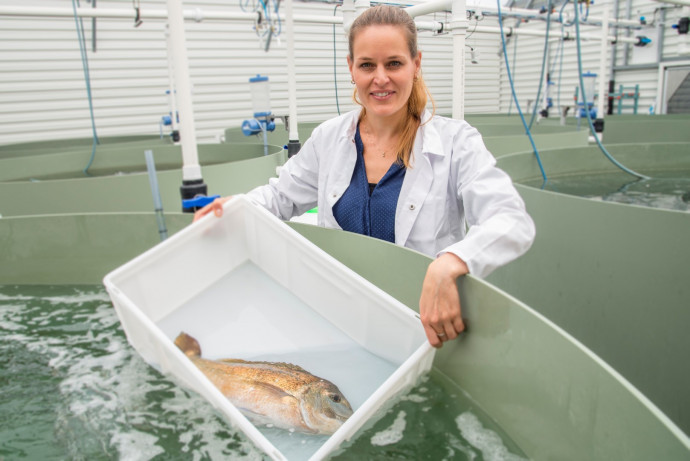News
Published 17 October 20182018 Hamilton Award: Developing snapper aquaculture through image 'fingerprinting' and genome research

Associate Professor Maren Wellenreuther has been awarded the Hamilton Award, the Royal Society Te Apārangi Early Career Research Excellence Award for Science, for her research to develop new aquaculture-ready species in New Zealand.
New Zealand aquaculture is currently dominated by three species: Greenshell™ mussels, Pacific oyster and King Salmon, but Associate Professor Wellenreuther is leading a research project to develop a native marine finfish species, such as snapper or trevally, to be aquaculture-ready within 5-10 years.
Based at Plant & Food Research in Nelson, with a part-time position at the University of Auckland, Associate Professor Wellenreuther received a $5.5 M MBIE grant in 2016 that allowed her to put together a diverse team of scientists to start the ambitious task of developing new species for aquaculture in New Zealand.
To do this, she and her team have been working on all aspects of the aquaculture farming system from developing a strong brood stock to breed from, hatching larvae and raising juveniles, and closely monitoring growth and determining what diets they need.
They have been applying novel technologies to help them do this, including image-based trait measurements, and a genomics programme.
Image-based libraries allow the rapid capture and storage of information relating to a wide range of fish traits, and provide accurate historical records for future research. Maren and her team are using these images to measure the visual patterning, akin to a fingerprint, of snapper, to identify individual fish in a population. Traditionally, fish were manually tagged to identify individuals then individually weighed and measured on a regular basis. The pattern fingerprinting has removed costs of manual tagging and provides a permanent, visual record of each individual over time.
The new breeding concept also identifies genes controlling traits of interest, which will be used to select parents for the breeding programme, supporting the breeding of high quality populations for aquaculture, and to significantly shorten the time to harvest.
“I am incredibly honoured to receive this award,” says Maren. “This award is an acknowledgement of the importance of seafood to New Zealand, from both an export and a cultural perspective, and how science can be applied in new ways to support the food sector. Targeted breeding of fish uses breeding and genomics skills that New Zealand is renowned for, albeit primarily in the horticulture industry, to support high quality exports of seafood and ensuring the viability of both wild and aquaculture fisheries.”
Maren has also become an advocate for the use of genomics to understand wild fish stocks, and is an Associate Investigator on a Marsden Fund grant to investigate the evolution of snapper populations. Part of her ongoing work focusses on coupling knowledge of wild stock genomics with the successful breeding programme to support the restocking of fish in regions where there were historically abundant.
Maren successfully applied for OECD funding to cover the costs of bringing 15 expert scientists from eleven countries together in 2016 to discuss the topic of how to harness the power of genomics to secure the future of seafood, conduct a panel session and give talks at the 7th World Fisheries Congress, held in Korea. A joint synthesis review paper from this meeting appeared in the journal Trends in Ecology and Evolution and has received strong interest from other researchers.
The medal selection committee said that Maren's solid theoretical understanding of ecological and evolutionary genomics underpins her important applied applications and she has demonstrated considerable scientific leadership in her field.
Maren completed her Bachelor and Master's degrees in Germany before gaining her PhD from the University of Auckland and then was a postdoctoral researcher and academic at Lund University in Sweden. In 2013 she received a prestigious award from the King of Sweden that is given to researchers who promote and contribute to the knowledge and preservation of biological diversity.
Royal Society Te Apārangi Early Career Research Excellence Award for Science (the Hamilton Award):
For encouraging scientific research in New Zealand by early career researchers.
Citation:
To Maren Wellenreuther for her advocacy in applying genomic-based methods to the seafood sector and highly innovative approaches to aquaculture breeding.
